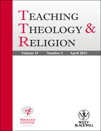
Teaching Theology and Religion
Scope & Guideline
Fostering Critical Dialogue in Religious Studies
Introduction
Aims and Scopes
- Interdisciplinary Approaches to Religious Education:
The journal emphasizes the integration of various disciplines in teaching theology and religion, encouraging educators to draw from sociology, anthropology, and cultural studies to enrich the learning experience. - Engaged Pedagogy and Global Citizenship:
A core aim is to promote engaged pedagogy that prepares students to be active global citizens, fostering critical thinking and ethical reflections on contemporary religious and social issues. - Innovative Teaching Strategies:
The journal frequently explores new methodologies and pedagogical techniques, such as team-based learning and experiential education, to enhance the effectiveness of theological instruction. - Interreligious and Comparative Studies:
It highlights the importance of interreligious dialogue and comparative studies, aiming to equip students with the tools to understand differing religious perspectives and their implications in a pluralistic society. - Contextual and Culturally Relevant Education:
The journal advocates for teaching practices that are sensitive to the cultural and contextual realities of students, emphasizing the importance of localized pedagogical approaches.
Trending and Emerging
- Decolonization in Theological Education:
A growing emphasis on decolonizing theology and religious education is evident, with discussions on how to integrate diverse cultural perspectives and challenge Eurocentric narratives within theological curricula. - Engagement with Social Justice Issues:
There is an increasing focus on social justice and ethical considerations within theological education, as educators seek to address contemporary societal challenges through a theological lens. - Integration of Technology in Teaching:
The incorporation of technology in theological education is on the rise, with innovative uses of digital platforms and online learning environments being explored to enhance student engagement. - Emphasis on Experiential Learning:
Recent publications highlight the importance of experiential learning, encouraging educators to implement hands-on, community-engaged projects that connect theological concepts with real-world applications. - Interdisciplinary Collaborations:
The journal is embracing interdisciplinary collaborations, as seen in papers that combine insights from various fields, such as psychology and environmental studies, to enrich theological education.
Declining or Waning
- Traditional Text-Centric Pedagogy:
There has been a decreasing emphasis on traditional, text-centric approaches to teaching theology, as educators increasingly seek to incorporate diverse methodologies that engage students more holistically. - Historical Studies in Isolation:
Papers focusing solely on historical studies without integrating contemporary relevance or pedagogical implications appear to be less frequent, indicating a shift toward more applied and interdisciplinary approaches. - Static Curriculum Models:
The journal shows a decline in articles advocating for static curriculum models, as the focus now leans towards adaptable and dynamic curricula that respond to changing societal contexts and student needs. - Exclusive Focus on Christian Theology:
While Christian theology remains central, there is a noticeable reduction in papers that exclusively address Christian perspectives, reflecting a broader interest in interreligious and comparative approaches. - Conventional Assessment Methods:
The exploration of conventional assessment methods in theological education is diminishing, with more emphasis now placed on innovative and formative assessment strategies that foster deeper learning.
Similar Journals

Didactica de las Ciencias Experimentales y Sociales
Elevating science and social studies through shared knowledge.Didactica de las Ciencias Experimentales y Sociales is a prestigious academic journal dedicated to advancing the field of science and social studies education. Published by the University of Valencia’s Department of Didactics in Experimental and Social Sciences, this journal has provided a vital platform for researchers and educators since its establishment. With an open access model in place since 1989, it ensures that valuable research findings are freely accessible, fostering wider educational impact and collaboration across institutions. Although lacking a specified H-Index or Scopus ranking at present, the journal consistently aims to disseminate high-quality research articles, review papers, and innovative educational practices that contribute to the improvement of science and social sciences teaching. As an essential resource for educators, researchers, and students alike, the journal invites contributions that explore diverse pedagogical strategies and empirical studies, reinforcing its commitment to enriching teaching methodologies in contemporary educational landscapes.

Sakarya Universitesi Ilahiyat Fakultesi Dergisi-Journal of Sakarya University Faculty of Theology
Cultivating a global dialogue on faith and philosophy.Sakarya Universitesi Ilahiyat Fakultesi Dergisi-Journal of Sakarya University Faculty of Theology is a leading academic journal dedicated to the field of theology, focusing on both religious studies and philosophical inquiries pertinent to contemporary issues. Published by SAKARYA UNIV, the journal has embraced an Open Access model since its inception in 2001, promoting the dissemination of knowledge and ensuring that the latest theological research reaches a global audience without barriers. Dedicated to fostering scholarly discourse, the journal welcomes contributions from researchers, professionals, and students alike, making it an essential resource for those engaged in the study of theology and related disciplines. With its commitment to rigorous peer review and a focus on high-quality research, this journal holds a significant place in the academic community, contributing to the advancement of theological scholarship in Türkiye and beyond.

ETUDES THEOLOGIQUES ET RELIGIEUSES
Exploring the Depths of Faith and ThoughtETUDES THEOLOGIQUES ET RELIGIEUSES, published by the prestigious Institut Protestant de Théologie in France, is a pivotal journal dedicated to advancing the field of religious studies. With an ISSN of 0014-2239, this academic publication showcases a diverse array of scholarly articles, reviews, and discussions that delve deep into theological discourse and religious phenomena. Despite its current Q4 category ranking in the broader scope of the Arts and Humanities, the journal serves as an invaluable platform for researchers, professionals, and students who seek to explore the complexities of religion in contemporary society. Covering a convergence of insights from 2002 to 2024, the journal aims to foster dialogue, critical thinking, and expanded knowledge within the religious studies community. Aiming to enhance its impact and visibility, ETUDES THEOLOGIQUES ET RELIGIEUSES invites contributions that challenge existing paradigms while encouraging interdisciplinary collaboration. Although it does not offer open access, the journal remains a respected source of scholarly content for those invested in the dynamic landscape of theology and religious inquiry, published in the vibrant academic context of Montpellier, France.

Teaching Statistics
Advancing Statistical Education Through Innovative Practices.Teaching Statistics is a peer-reviewed journal published by Wiley, dedicated to the advancement of statistical education and pedagogical methodologies. With its ISSN 0141-982X and E-ISSN 1467-9639, this esteemed journal has been an integral resource since its inception in 1979, providing a platform for innovative research and practices aimed at enhancing teaching effectiveness in statistics across various educational levels. Housed in the United States, it maintains a significant global presence and engagement, evidenced by its Q3 quartile rankings in both the Education and Statistics and Probability categories as of 2023. Furthermore, it holds commendable Scopus rankings, reflecting its influence in the fields of Mathematics and Social Sciences. Although not an Open Access journal, it fosters a wealth of knowledge beneficial to researchers, educators, and students alike, striving to elevate the standards of statistics education through comprehensive discussions and analyses. Through its commitment to the dissemination of valuable insights and resources, Teaching Statistics continues to be a vital asset for academic and professional communities seeking to enhance statistical learning and teaching methodologies.
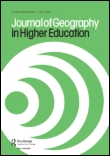
JOURNAL OF GEOGRAPHY IN HIGHER EDUCATION
Exploring innovative pedagogies in geography and education.JOURNAL OF GEOGRAPHY IN HIGHER EDUCATION is a premier academic journal that serves as a vital platform for scholarly discourse in the fields of geography and education. Published by Routledge Journals, Taylor & Francis Ltd, this esteemed journal has been at the forefront of advancing research and pedagogical practices since its inception in 1977, with contributions converging until 2024. With an impressive reputation characterized by its Q1 ranking in both Education and Geography, Planning and Development for 2023, the journal is positioned as a leading resource for educators and researchers alike, boasting an elite placement in the Scopus ranks. The journal aims to disseminate innovative research, encourage interdisciplinary dialogue, and enhance teaching methodologies, which are essential for fostering a comprehensive understanding of geographical concepts in higher education. As a vital resource for academics, professionals, and students, the JOURNAL OF GEOGRAPHY IN HIGHER EDUCATION continues to shape the nexus of geography and education, offering insights that influence teaching and learning approaches globally.

Logos & Pneuma-Chinese Journal of Theology
Advancing Scholarly Dialogue in Chinese Religious StudiesLogos & Pneuma-Chinese Journal of Theology, published by LOGOS & PNEUMA PRESS, serves as a vital platform for theological discourse and research within the context of Chinese religious studies. Established in 2008 and continuing to contribute valuable insights up until 2023, this journal holds a Q4 ranking in Religious Studies for 2023, illustrating its emerging influence within the field. Although it currently lacks an impact factor and open access options, the journal provides a unique perspective on contemporary theological issues and practices relevant to scholars and practitioners engaging with Chinese Christianity and other religious traditions. It is an essential resource for researchers, students, and professionals seeking to enrich their understanding of the interplay between religion and culture in a rapidly evolving social landscape. Located in the heart of the New Territories, China, the journal invites submissions that reflect a broad range of theological inquiries, encouraging critical engagement and scholarly dialogue.

Sirnak University Journal of Divinity Faculty
Advancing Theological Discourse for a Global AudienceWelcome to the Sirnak University Journal of Divinity Faculty, a premier open-access journal dedicated to the exploration of diverse theological, philosophical, and cultural issues within the realm of religious studies. Published by Sirnak University, this journal has been freely accessible since 2010, ensuring that scholars, professionals, and students can engage with high-quality research without barriers. With an emphasis on interdisciplinary approaches and innovative perspectives, the Sirnak University Journal of Divinity Faculty aims to foster academic discourse and contribute to the broader understanding of divinity and related disciplines. Though the journal is relatively new, it strives to establish a significant presence in the field by welcoming original research articles, reviews, and theological reflections from researchers worldwide. Join us in advancing the academic study of divinity and enriching the scholarly community.
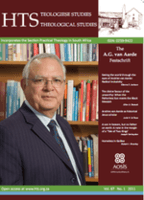
HTS Teologiese Studies-Theological Studies
Championing open-access scholarship in theology.HTS Teologiese Studies-Theological Studies, published by AOSIS, is a premier open-access journal dedicated to advancing the field of theological studies. Since its inception in 1943, it has provided a platform for diverse scholarly voices across the globe, promoting rigorous research and discourse in religious studies. This journal holds a commendable Q1 ranking in the field, currently positioned at Rank #68 out of 644 in the Scopus Arts and Humanities category, highlighting its critical influence and relevance. The journal encourages the dissemination of high-quality and impactful research, making it an essential resource for researchers, professionals, and students interested in the multifaceted dimensions of theology. Housed in South Africa, HTS Teologiese Studies serves as a vital link between African theological discourse and the global academic community, continuously aiming to explore new paradigms and perspectives within the field.
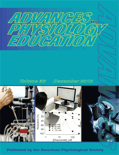
ADVANCES IN PHYSIOLOGY EDUCATION
Elevating Pedagogy in Physiology EducationADVANCES IN PHYSIOLOGY EDUCATION, published by the American Physiological Society, is a leading journal dedicated to the field of physiology education, with a commitment to advancing teaching practices and pedagogical strategies in this vital discipline. Established in 1998, the journal has consistently provided a platform for original research and discussion, fostering the improvement of educational methodologies. With an impressive impact factor and ranked in Q2 for Education and Q3 for Physiology, it reflects a robust academic influence within the research community. The journal ranks #458 out of 1543 in Social Sciences - Education and #130 out of 193 in Biochemistry, Genetics, and Molecular Biology - Physiology according to Scopus, highlighting its critical role in shaping physiology education. While it operates on a subscription model, its focus remains on promoting innovative education practices that benefit both educators and students alike. This journal is essential reading for anyone looking to enhance their understanding of physiology teaching and learning.
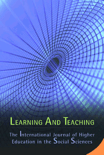
Learning and Teaching-The International Journal of Higher Education in the Social Sciences
Fostering Dialogue Between Research and Practice in Higher EducationLearning and Teaching: The International Journal of Higher Education in the Social Sciences, published by BERGHAHN JOURNALS, stands at the forefront of interdisciplinary scholarship dedicated to enhancing the pedagogical landscape within the social sciences. With its Open Access model established in 2020, this journal provides a vital platform for disseminating innovative research and best practices that contribute to the evolving dynamics of higher education. Operating from the United States, and noted for its relevance in Developmental and Educational Psychology, Education, and Sociology and Political Science, Learning and Teaching has achieved commendable rankings, positing it in the Q3 and Q2 quartiles in several categories as of 2023. This recognition underscores its importance as a resource for researchers, educators, and students alike, fostering a robust dialogue about teaching strategies, learning environments, and educational theories. By converging research and practice from 2017 to 2024, Learning and Teaching is poised to influence the future of education, preparing scholarly contributors to address the complexities of learning in the social sciences effectively.